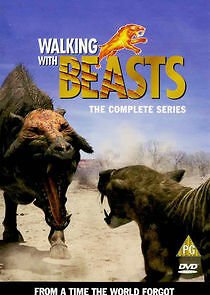|
49 million years ago, Early Eocene (Germany) Filming location: JavaThe first episode depicts the warm tropical world of the early Eocene which was 16 million years after the extinction of the non-avian dinosaurs. Birds, including the giant carnivorous Gastornis, rule this world, while mammals are still very small. The setting is near the Messel pit in Germany. Due to volcanic activity, sudden bulk escapes of carbon dioxide trapped underneath lakes pose a significant hazard to the local wildlife. The episode centers around a Leptictidium family, a leaping, shrew-like mammal, which has emerged in the dawn hours to forage for food. As the mother Leptictidium forages, first in solidarity, and then with her pups, she wanders near a large predatory mammal, identified as an Ambulocetus ("walking whale"). Despite its crocodilian similarity, the Ambulocetus is shown swimming by caudal undulation like a modern cetacean. A female Gastornis, who has been taking care of the single egg in her nest, makes two attempts to hunt a small herd of Propalaeotherium. The first attempt fails when sounds among the vegetation betray her presence. The second attack proves successful when the Propalaeotherium consume fermenting grapes and are unable to evade her attack. The Gastornis also defends her territory from another Gastornis. Unfortunately, while the mother hunts, a horde of Formicium (identified as giant carnivorous ants, and the identified species later renamed to Titanomyrma) encounter the egg when it was just starting to hatch. When the female discovers her dead offspring at dusk she leaves the forest to try and start another family.With the arrival of night, a band of lemur-like Godinotia, socialize and copulate in the dark. Ambulocetus finally manages to catch a small carnivore near the lake edge. As the night wears on, an earth tremor unleashes trapped carbon dioxide out from underneath the lake and the gas suffocates most of the surrounding life. The Leptictidium survive because the nest was upwind of the gas, and Gastornis also survived because she left that area in the forest.It is mentioned that although the Leptictidium survived the gas, they would ultimately leave a mystery if that species had a descendant like a shrew or not but most likely they left no descendants, while the Ambulocetus (who was killed by the lethal gases) would evolve into the whales, hereby setting the scene for the next episode.Animals: Leptictidium · Gastornis · Ambulocetus · Propalaeotherium · Godinotia · Eurotamandua · Titanomyrma · Creodont · Gecko · Crocodilian (live-acted by a mugger crocodile) · Frog (live-acted by a White's tree frog) · Snake (live-acted by a red-tailed green rat snake) · Bats (in book only) |
||
| Title: | New Dawn | |
| Air Date: | November 15, 2001 | |
| Runtime: | 60 min | |



jamouyi : dont know why they made watchmen 1 and 2 when so far it doesnt stray that far from the mov...